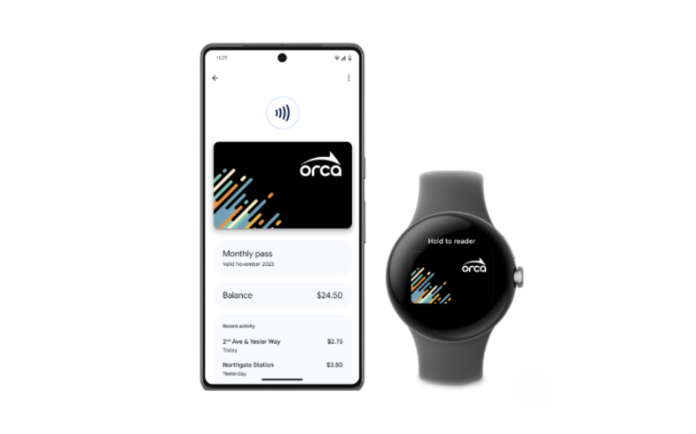Google Wallet will soon support digital ORCA cards and allow for contactless payment via Android-powered mobile devices. That will save many Puget Sound transit riders the need for a physical ORCA card.
Mobile payments have been a highly anticipated feature since the new ORCA system launched last year. Google will have the distinction of being the first entrant into the ORCA mobile payments arena but won’t be the last.
In an announcement on Thursday, Google said that the company would support mobile fare payments in hundreds of transit markets across the globe. Prominently featured in the announcement was a digital ORCA card on an Android phone and Wear OS watch. The mockup of the digital cards also showed a valid monthly pass, available e-purse balance, and recently logged trips. Wallet users will be able to instantly create a virtual ORCA card and add funds and passes — all through the app.
Maps, a well-used mobile trip planning tool by Google, is also offering fare payment integration. When using the transit trip planning function, riders will be notified of applicable fares and have the option of paying via Wallet.
Last December, Sound Transit staff said that the first ORCA mobile payment solution might launch in the second quarter of this year. That obviously didn’t happen, but it also isn’t all too far off from Google’s planned roll out.
At the time, Brittany Esdaile, Sound Transit’s fare payment systems manager, explained why deployment of mobile payments has been slow-going.
“We just we couldn’t introduce [mobile payments] until the legacy equipment was retired. This is one of the few reasons why it wasn’t part of our initial launch, but there are a couple more,” Esdaile said. “We are highly dependent on multiple third-party developers and the timing of their platforms. We can influence this but we really can’t control the timing for private businesses.”
Esdaile also said that the landscape for mobile payments has been evolving quickly and that’s complicated timing.
“The way we integrate our ORCA system to the mobile wallets has changed, since some of the solutions across North America have launched previously,” Esdaile said. “So we really had to fit our solution into that new integration, and that does require new development.”
Sound Transit has said that the agency plans to develop a digital ORCA card integration for its forthcoming Sound RideGuide mobile app. That would allow app users to pay for trips in the same way as Google. The agency is hoping to deliver that feature by mid-2025 but there’s always the potential that the timeline could slide. Sound Transit’s app will essentially be a stand-in for the ORCA pod since ORCA itself doesn’t have plans to launch a standalone digital card.
Apple seems a likely candidate to follow Google in delivering a mobile payments app compatible with ORCA. The company is Google’s main competitor in the North American market with its Apple Pay system. Apple Pay and Google Pay are both widely available as fare payment options in transit systems across the country that use modern contactless payment readers. Spokane Transit Authority and Portland’s TriMet, which uses the same INIT-powered card readers as ORCA, even supports both.
The Urbanist did ask if there is a clearer timeline for further implementation of third-party mobile payments. ORCA officials were opaque saying, “We are committed to bringing the convenience of mobile payments to all our customers, but we have nothing else to share at this time.”
ORCA readers will eventually accept credit and debit cards, too, using the new near-field communication capabilities. David Jackson, a Sound Transit spokesperson, said that the feature is “on the ORCA product roadmap for the future” but didn’t offer a timeline. Similar INIT card readers in Spokane and Portland already use the feature.
Stephen is a professional urban planner in Puget Sound with a passion for sustainable, livable, and diverse cities. He is especially interested in how policies, regulations, and programs can promote positive outcomes for communities. With stints in great cities like Bellingham and Cork, Stephen currently lives in Seattle. He primarily covers land use and transportation issues and has been with The Urbanist since 2014.


